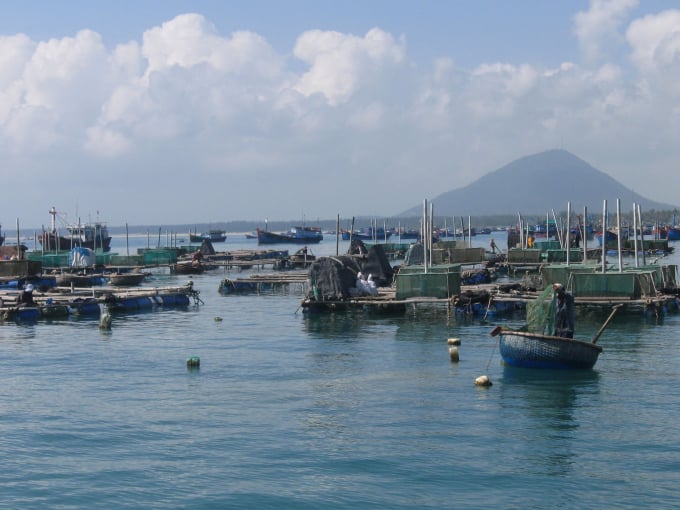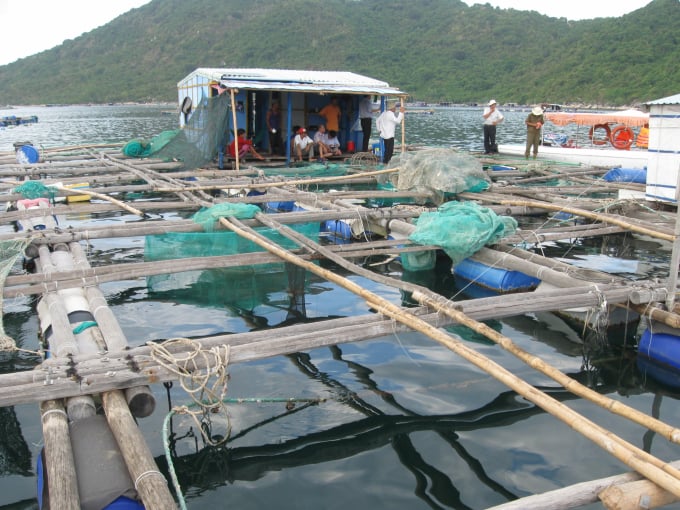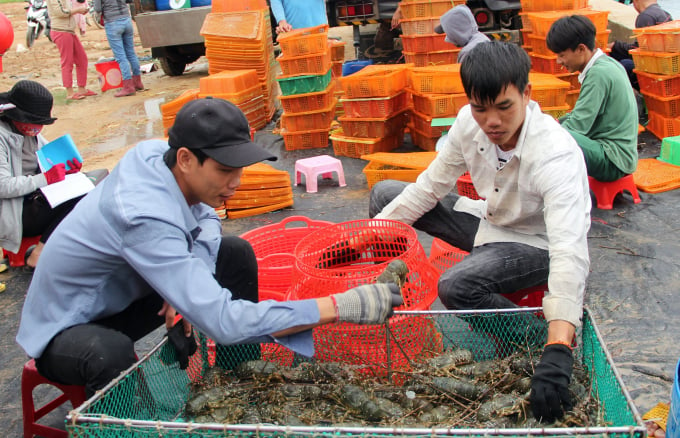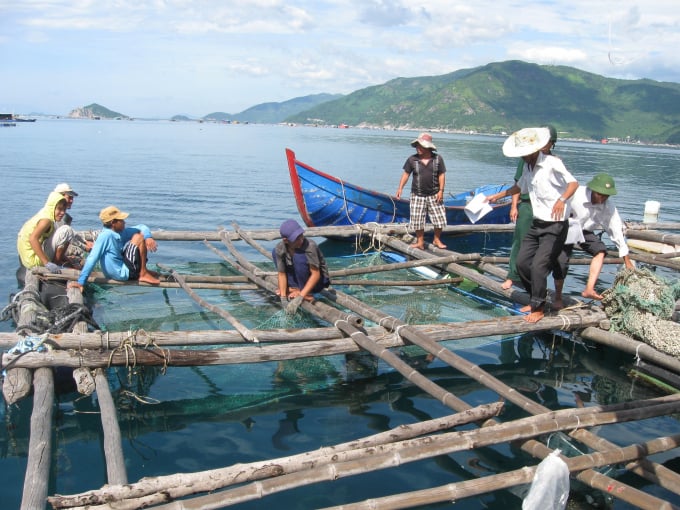November 19, 2025 | 04:20 GMT +7
November 19, 2025 | 04:20 GMT +7
Hotline: 0913.378.918
November 19, 2025 | 04:20 GMT +7
Hotline: 0913.378.918
Xuan Dai Bay in Song Cau Town in the south-central province of Phu Yen used to have favourable conditions for lobster farming including large water surface area, airiness and a stable water environment.

Xuan Dai Bay in Song Cau Town is known as a capital of lobster farming in the south-central province of Phu Yen. Photo: KS.
However, in the last few years, environmental indicators proved that the water is no longer suitable to raise aquaculture, particularly lobster.
Tran Van Tuan, a lobster farmer in Xuan Yen Ward, Song Cau Town said that in the last five years, lobster farming faced disadvantages due to serious water pollution.
He blamed the environmental pollution for a high density of cages that are used for lobster farming and untreated waste like dead fish or leftovers.
“Some farmers collect the waste and bring it onshore to treat while others leave the waste at the lobster raising areas,” he said, noting that the quality of water was a decisive factor in the failure or success of lobster farming.
Le Thi Hang Nga, vice head of Phu Yen province’s Aquaculture Production Division said that an environmental incident in 2017 caused by hot weather during the daytime and thunderstorm in the evening resulted in the lack of oxygen in the water that killed lobster massively.

The number of lobster cages in Xuan Dai Bay is now much higher than the planned one. Photo: MH.
Seeing high profits of lobster farming and diversified and cheap lobster breeding, farmers rushed to raising lobster, which led to a sharp increase in lobster cage farming.
Under the province’s aquaculture production planning, the province expected to have 49,000 cages but its latest statistics revealed that it now has nearly 90,000 cases, mostly in Xuan Dai Bay.
Nga said that local authorities recommended farmers reduce the number of cages and better manage their lobster raising process.
Particularly, they have to collect dead fish or leftovers and then, take them to the mainland for treatment.
Meanwhile, they should use fresh feed for lobster besides bioproducts, minerals and vitamins to help increase the lobster’s immune system to better fight against diseases.

In 2017, many lobster farmers in Xuan Dai Bay got losses due to environmental incident that caused massive lobster deaths. Photo: KS.
Vice director of the province’s Agriculture and Rural Development Department Nguyen Tri Phuong said that according to scientists, Xuan Dai Bay could deal with about 20,000 lobster cages.
Excessing such a number, it was difficult to ensure sustainability for the lobster farming, Phuong said, emphasizing the need to reduce the number of lobster cages in the bay.
However, it was difficult to solve the problem, he said.
“Moving the cages to sea requires farmers’ high skills, investment and proper farming technology,” he said.
Moreover, under current regulations, when allocating a marine area for farmers to raise aquaculture, local authorities have to base on national and provincial space planning but the two plannings were not available now, he said.
In some cases, without the plannings, specific projects could still be considered after consultations of relevant agencies proved that the aquaculture farms' sites did not affect any other planning.

Wooden lobster cages are easily damaged by strong winds or storms. Photo: NC.
Le Thi Hang Nga, vice head of Phu Yen province’s Aquaculture Production Division said that for the long term, to better manage the waste of lobster farming, it was necessary to properly manage the farming process, particularly the feeding process.
Now, farmers were feeding lobster with fresh small fish, resulting in a big amount of waste.
According to researchers, to get a kilo of lobster, about 20-24 kilo of fresh small fish was needed, Nga said, adding that if the fresh food was replaced processed one, the waste discharged into the environment would be reduced and then, water pollution could be curbed.

(VAN) Deputy Prime Minister Tran Hong Ha convened a meeting with the MAE and relevant agencies to discuss the draft decree on national multidimensional poverty standards for the 2026 - 2030 period.

(VAN) The year 2025 marks the 10th anniversary since more than 190 countries adopted the Paris Agreement on climate change, paving the way for strengthened global action.

(VAN) The PepsiCo Foundation funded the project ‘New Harvest: Sustainable Agriculture Initiative’, focusing on regenerative agriculture and climate change.

(VAN) Dr. Nguyen Viet Hung, ILRI's Regional Director for Asia, emphasized the One Health approach in ensuring food safety and reducing antimicrobial resistance risks in livestock.

(VAN) The youth-driven initiative ‘Innovate for water, act for the future’ seeks practical, scalable solutions to Vietnam’s water challenges.

(VAN) At the Annual Science Conference of Thuyloi University, Deputy Minister Phung Duc Tien directed researchers to focus on in-depth studies, data harmonization, and solutions linked to real-world practice.

(VAN) After nearly four years of implementation, 5,187 community agricultural extension groups have been established nationwide, with 47,493 members participating.